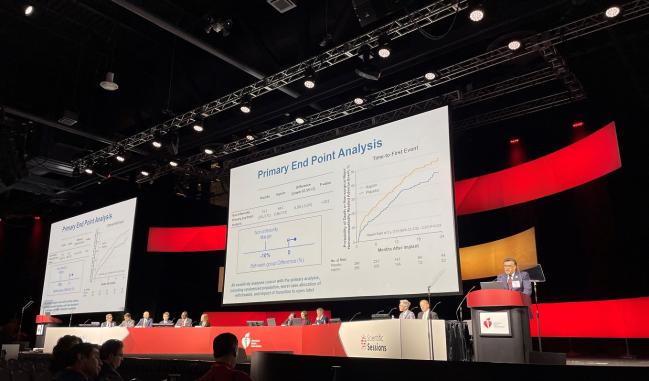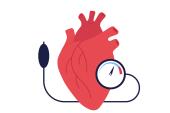Dropping Aspirin Cuts Strokes, Bleeds, Hospital Stays in LVAD Patients: ARIES-HM3
Aspirin is routine after an LVAD. A placebo-controlled trial shows nothing is lost when aspirin goes, but there’s much to gain.

PHILADELPHIA, PA—Adding to a growing list of medical situations in which aspirin appears to do more harm than good, the ARIES HM3 trial has shown that it can safely be dropped from the antithrombotic regimen patients typically take after receiving the HeartMate 3 left ventricular assist device (LVAD).
Presenting the findings here at the American Heart Association 2023 Scientific Sessions, Mandeep R. Mehra, MD (Brigham and Women’s Hospital and Harvard Medical School, Boston, MA), noted that HeartMate 3 (Abbott) was specifically designed to minimize destruction of red blood cells and thrombosis. Observational 5-year results of the MOMENTUM 3 trial showed that the magnetically levitated, centrifugal-flow LVAD significantly improved on a range of hard endpoints, including survival free from disabling stroke or reoperation/replacement.
But while thrombosis rates remain very low, he noted, and ischemic and hemorrhagic strokes were rare in the trial, patients still end up in hospital, many as a result of gastrointestinal bleeding. That makes bleeding and associated events key targets for further improving outcomes in these stage D heart failure patients, he said, which is how aspirin ended up in ARIES-HM3’s crosshairs.
In fact, as transplant cardiologist Eric D. Adler, MD (University of California San Diego, CA), pointed out in a discussion following Mehra’s presentation, ARIES-HM3 represents “the first medical therapy trial in patients with mechanical circulatory support that’s truly placebo controlled and frankly one of the few positive trials of medical therapy in stage D heart failure.”
ARIES-HM3, he said is “an incredibly important trial in our space.”
Biykem Bozkurt, MD, PhD (Baylor College of Medicine, Houston, TX), speaking with TCTMD, agreed. “I think this is paradigm changing. I think this study is truly going to impact the way we practice.”
The ARIES-HM3 results were published simultaneously in JAMA.
ARIES-HM3 Results
Mehra and colleagues randomized 624 patients from 51 centers in nine countries to either 100 mg of aspirin or placebo on top of standard vitamin K antagonist (VKA) therapy, using a target INR range of 2.0-3.0. After death, transition to open-label therapy, or withdrawal from the trial, 544 patients were available for evaluation of the primary endpoint: survival free from any nonsurgical major “hemocompatibility-related adverse event” such as a stroke, pump thrombosis, major bleed, or arterial peripheral thromboembolism. Women made up fewer than one-quarter of the study group and 60% of trial participants were white.
By 1 year, 74.1% of placebo-treated patients were free from a primary endpoint event as compared with 68.1% of aspirin-treated subjects, meeting the bounds for noninferiority. In a time-to-first event analysis, deaths or nonsurgical major hemocompatibility related adverse events were 27% lower in the placebo-treated patients (HR 0.73; 95% CI 0.55-0.97).
Looking exclusively at rates of nonsurgical bleeding, this gap was wider still, again favoring placebo-versus aspirin-treated patients (30% vs 42.4%),a 33% relative reduction (HR 0.67; 95% CI 0.50-0.92). For every 100 patients implanted with an LVAD, said Mehra, 14.5 major bleeding events were averted in the first year; gastrointestinal bleeds were reduced by almost 40%.
At 2 years, no differences were seen in rates of thrombosis, mortality, or time in VKA therapeutic range.
There are real human and cost savings to be had by dropping aspirin, Mehra continued. In US patients, investigators saw a 47% reduction in hospitalizations due to bleeding events and a 41% drop in costs related to those events. “In patients with advanced heart failure receiving support from a fully levitated HeartMate 3 LVAD, aspirin is not required as part of an antithrombotic regimen that includes a vitamin K antagonist to preserve outcomes,” Mehra concluded.
I think we can all agree that there are very few good days spent in the hospital for our patients. Eric D. Adler
Adler, in his talk, highlighted a number of these findings, emphasizing the “surprisingly and impressively large reduction in all stroke types—ischemic and nonischemic, both debilitating and nondebilitating. . . . And to me, what’s most important is the 47% reduction in hospital days. One of the first questions I ask when I see a patient with Stage D heart failure is: do you have more good days than bad? And I think we can all agree that there are very few good days spent in the hospital for our patients, so by reducing the hospitalization days by 47%, we’re dramatically changing this therapy.”
ARIES-HM3, Adler continued, is also a reminder that there is more room to improve LVAD therapy above and beyond the profound strides this field has made over the last 2 decades. Not only is there room to innovate with assist devices, he said, but also, as ARIES makes clear, there is ground to cover with regard to improving drug therapy.
For example, he said: “Do we really know, from an evidence-aged standpoint, that GDMT actually helps improve quality of life with LVAD patients? It’s intuitive, but intuitive is what aspirin was and we used it for many years. And it turned out to be more harmful than [helpful].”
One question lingering in Bozkurt’s mind is what to do about patients who are already taking aspirin for another indication. She was struck by the subgroup analyses showing that across a swath of clinical conditions including ischemic heart disease, history of stenting or CABG, atrial fibrillation, prior stroke, and more, placebo-treated patients tended to fare better. Approximately 14% of patients in this study were already on aspirin at baseline, she noted. In these patients, an additional trial might help clarify whether aspirin should be stopped, even temporarily, early after LVAD implantation.
“We tend to continue it, but seeing that subgroup analysis made me pause. For those patients, I think having a second study demonstrating similar, maybe even a superiority trial, would be important,” Bozkurt suggested
Shelley Wood was the Editor-in-Chief of TCTMD and the Editorial Director at the Cardiovascular Research Foundation (CRF) from October 2015…
Read Full BioSources
Mandeep R. Mehra MR, Netuka I, Uriel N, et al. Aspirin and hemocompatibility events with a left ventricular assist device in advanced heart failure: the ARIES-HM3 randomized clinical trial. JAMA. 2023;Epub ahead of print.
Disclosures
- Mehra reports receiving consulting fees paid to the Brigham and Women's Hospital from Abbott during the conduct of the study and personal fees from Moderna, Natera, Transmedics, Paragonix, NupulseCV, FineHeart, and Leviticus outside the submitted work.
- Adler reports being an employee at Lexeo Therapeutics, where he is the Chief Scientific Officer, and having ownership interest in Papillion Therapeutics, and receiving royalties/patent beneficiary payments from Rocket Pharmaceuticals.





Comments